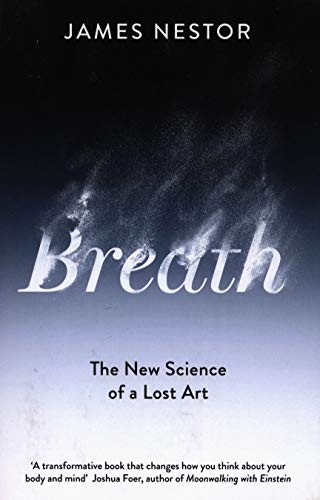skaficionado reviewed Breath by James Nestor
Review of 'Breath' on 'Goodreads'
to-read

paperback, 336 pages
Published June 17, 2020 by Penguin Life.
300,000 years ago, Homo sapiens had bigger skulls. Cooked food meant our heads shrunk; alongside a growing brain, our airways got narrower. Urbanisation then led us to breathe less deeply and less healthily. And so today more than 90% of us breathe incorrectly. So we might have been breathing all our life, but we need to learn how to breathe properly!
In 3.3, James Nestor meets cutting-edge scientists at Harvard and experiments on himself in labs at Stanford to see the impact of bad breathing. He revives the lost, and recently scientifically proven, wisdom of swim coaches, Indian mystics, stern-faced Russian cardiologists, Czechoslovakian Olympians and New Jersey choral conductors - the world's foremost 'pulmonauts' - to show how breathing in specific patterns can trigger our bodies to absorb more oxygen, and he explains the benefits for everyone that result, from staying healthy and warding off anxiety to improving focus …
300,000 years ago, Homo sapiens had bigger skulls. Cooked food meant our heads shrunk; alongside a growing brain, our airways got narrower. Urbanisation then led us to breathe less deeply and less healthily. And so today more than 90% of us breathe incorrectly. So we might have been breathing all our life, but we need to learn how to breathe properly!
In 3.3, James Nestor meets cutting-edge scientists at Harvard and experiments on himself in labs at Stanford to see the impact of bad breathing. He revives the lost, and recently scientifically proven, wisdom of swim coaches, Indian mystics, stern-faced Russian cardiologists, Czechoslovakian Olympians and New Jersey choral conductors - the world's foremost 'pulmonauts' - to show how breathing in specific patterns can trigger our bodies to absorb more oxygen, and he explains the benefits for everyone that result, from staying healthy and warding off anxiety to improving focus and losing weight.
3.3 is a fascinating ride through evolution, medicine and physiology - and extreme sports. But mostly it explores you. Structured as a journey with chapters from the mouth and nose through to the lungs and nervous system, it is non-fiction at its breath-taking best.
to-read
There's a lot to be said about breathing and its place in our lives but I'm not sure this book is saying it. Oh, it might be but it's not convincing for some reason. It's a little too dramatic--a little too "this revolutionary truth is being overlooked"--but at the same time, there are such overlooked truths about breath, I think . . . Maybe I need to do all the breathing exercises and experience it directly but some are scary--they come with warnings--and others need to be repeated over a long period for results that aren't exactly clear.
The first surprising truth is that mouth breathing is bad for you. The "proof" is experienced by the author who has his nose sealed off as an experiment, but I'm not sure it proves what he says it does. It may merely show that having your nose sealed off has adverse results. …
There's a lot to be said about breathing and its place in our lives but I'm not sure this book is saying it. Oh, it might be but it's not convincing for some reason. It's a little too dramatic--a little too "this revolutionary truth is being overlooked"--but at the same time, there are such overlooked truths about breath, I think . . . Maybe I need to do all the breathing exercises and experience it directly but some are scary--they come with warnings--and others need to be repeated over a long period for results that aren't exactly clear.
The first surprising truth is that mouth breathing is bad for you. The "proof" is experienced by the author who has his nose sealed off as an experiment, but I'm not sure it proves what he says it does. It may merely show that having your nose sealed off has adverse results. It doesn't show that breathing only partially through your nose is bad for you.
So that's he kind of book this is. If you want to take it as a starting point for your own personal research, it should serve. There's clearly stuff in there that deserves to be further explored. I tried to follow up on some of this book's claims by searching the internet and there are legit medical journals who seem to support many of its theses.